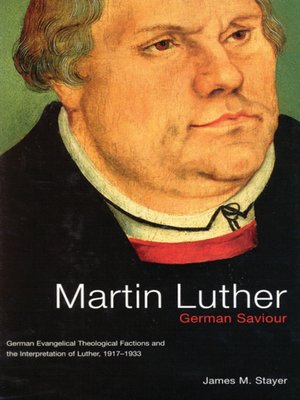Martin Luther, German Saviour
ebook ∣ German Evangelical Theological Factions and the Interpretation of Luther, 1917-1933
By James M. Stayer

Sign up to save your library
With an OverDrive account, you can save your favorite libraries for at-a-glance information about availability. Find out more about OverDrive accounts.
Find this title in Libby, the library reading app by OverDrive.



Search for a digital library with this title
Title found at these libraries:
| Library Name | Distance |
|---|---|
| Loading... |
Theological trend-setters after the war were dogmatic or systematic theologians. Whether men of the right like Karl Holl or men of the left like Karl Barth, they wanted to return to Luther's fundamental Reformation theology and to justification through faith alone. In the mid-1920s, however, Barth saw the dangers of Lutheran theocentrism wedded to German nationalism and moved towards a more Reformed Christology and a greater critical distance from Luther. The other six major Weimar-era theologians discussed - Karl Holl, Friedrich Gogarten, Werner Elert, Paul Althaus, Emanuel Hirsch, and Erich Vogelsang - connected their theology to their Luther studies and to their hopes for rebirth of Germany after the humiliation of the Versailles order. To differing degrees they presented Martin Luther as the German saviour and all except Karl Holl, who died in 1926, worked out specifically theological reasons for supporting Hitler when he came to power in 1933.







